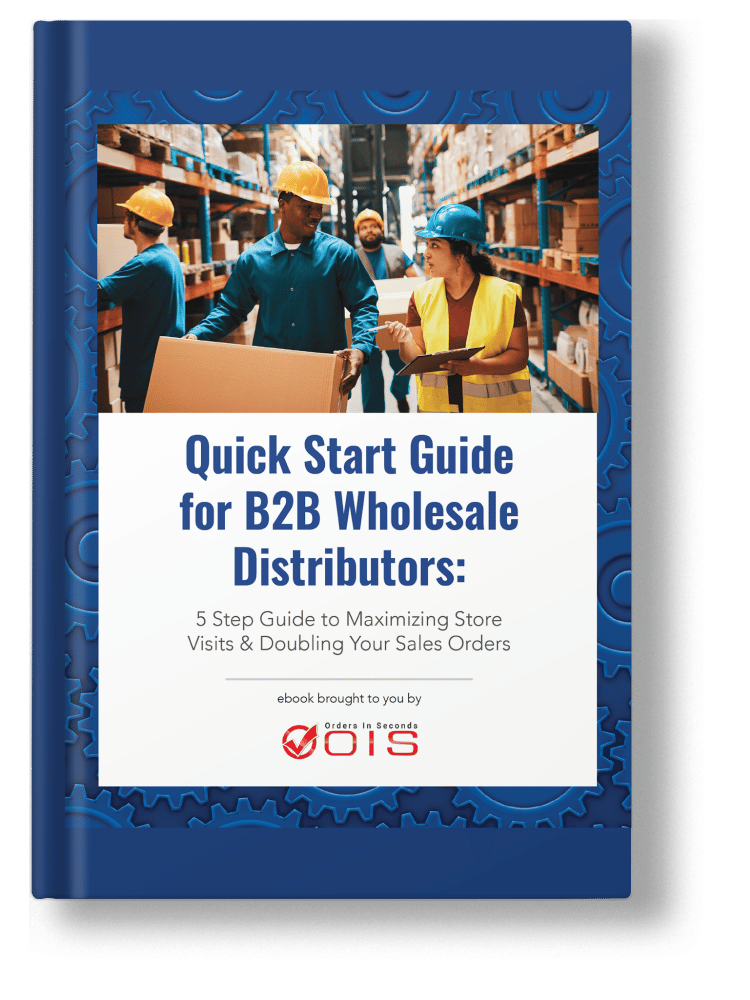Looking for the best inventory management software small business solutions? This guide covers top software choices, their features, and how they can help you maintain efficiency. Read on to find the perfect tool for your needs.
Key Takeaways
- Effective inventory management is crucial for small businesses, reducing costs and increasing customer satisfaction by maintaining optimal stock levels.
- Top-rated inventory management software options include Zoho Inventory, Orders in Seconds, Sortly, Salesbinder, and Cin7, each tailored to different business needs.
- When selecting inventory management software, prioritize key features such as real-time tracking, multi-channel management, and integration capabilities for seamless operations.
Table of Contents
- Importance of Inventory Management for Small Businesses
- Top Inventory Management Software for Small Business Owners
- Key Features to Look for in Inventory Management Software
- Benefits of Using Inventory Management Software for Small Businesses
- How to Choose the Right Inventory Management Software
- Free vs. Paid Inventory Management Software
- Common Challenges in Inventory Management and How Software Helps
- Summary
- Frequently Asked Questions
- Orders in Seconds: The Trusted Solution for Small and Mid-Size Wholesale Distributors
Importance of Inventory Management for Small Businesses

Effective inventory management minimizes the risk of both excess stock and shortages, ensuring a balanced flow of resources. This balance maintains better cash flow and avoids the financial pitfalls of overstocking or stockouts. Efficient inventory management allows businesses to allocate resources where they are needed most, paving the way for sustainable growth.
Organized inventory management contributes to smoother overall operations, enabling businesses to focus on growth instead of constantly correcting issues. Accurate, up-to-date inventory records ensure smooth supply chain operations, from procurement to sales. This streamlined process saves time and reduces overhead costs by optimizing storage and order processes.
An efficient inventory management system significantly cuts overhead costs by optimizing storage and order processes. It enhances order accuracy, decreasing costly returns and customer dissatisfaction. Inventory management software also improves record accuracy by reducing human errors, ensuring records are always current.
Effective inventory control leads to higher customer satisfaction, as customers are more likely to return when their orders are fulfilled accurately and on time. Balanced inventory levels help businesses avoid ordering too much or too little, ensuring they are always prepared to meet customer demand.
Top Inventory Management Software for Small Business Owners
Choosing the right inventory management software is key for small business owners to maintain efficiency and effectiveness in inventory tracking. Among the myriad options available, several stand out for their reliability and features. If you want to streamline your operations, you should choose inventory management software that fits your needs.
Top inventory management software picks include Zoho Inventory, Orders in Seconds, Sortly, Salesbinder, and Cin7. Each tool offers unique advantages tailored to different business needs, making it essential to choose the best inventory management software for your requirements.
Zoho Inventory
Zoho Inventory is the top choice for small businesses in 2024, known for its affordability, functionality, and ease of use. It’s designed to cater to the needs of growing businesses by providing essential inventory management tools without breaking the bank. The free plan offers robust features, including tracking 50 sales orders, 50 shipping labels, one warehouse, one Shopify integration, and inventory reports.
Starting at $0, Zoho Inventory is accessible for entrepreneurs just starting out. As businesses grow, Zoho provides tiered pricing plans that expand capabilities and features, ensuring scalability. This flexibility makes Zoho Inventory a smart choice for both new and growing enterprises.
Orders in Seconds
Orders In Seconds is a top-notch solution for small and mid-size wholesale distributors and manufacturers, offering a comprehensive suite of tools to streamline their order management and inventory processes. With a user-friendly interface and robust features, Orders In Seconds is a top choice for small to medium size businesses seeking to enhance efficiency and accuracy.
Key features and benefits:
- Mobile-friendly interface: Easily place orders on the go with the Orders In Seconds mobile app.
- Real-time order tracking: Monitor the status of orders from initial placement to delivery.
- Product catalog management: Maintain a centralized catalog of products, including images, descriptions, and pricing.
- Customer information management: Store and access customer details, including contact information, order history, and preferences.
- Integration with existing systems: Seamlessly connect Orders In Seconds with your ERP, CRM, or other business systems.
Whether you’re a small-medium distributor or manufacturer, Orders In Seconds can help you optimize your order management processes and improve overall business efficiency.

Avoid the Top 5 Mistakes Wholesale Distributors Make
Are you making one of the top 5 mistakes that plague wholesale distributors? Download our free eBook to find out. We’ve also included tips and guidance to help you save time and avoid costly mistakes.
Sortly
Sortly stands out with its user-friendly mobile app, enabling businesses to manage inventory on-the-go. It offers features like in-app barcode scanning, automated reports, and low stock alerts, simplifying inventory management. For small businesses that need to operate offline, Sortly allows inventory counts to be modified without constant internet access.
However, the free plan is limited to 100 item types, and generating your own barcodes requires a subscription to the Ultra plan or higher. Despite these limitations, Sortly’s various pricing tiers provide advanced features suitable for growing businesses, earning it a user rating of 4.1 out of 5 on Google Play.
Salesbinder
Salesbinder’s standout feature is its unlimited location tracking, crucial for businesses managing inventory across multiple locations.
The free plan includes essential features like:
- invoicing
- purchase orders
- barcoding
- shipment tracking
- CRM tools
This makes it a comprehensive solution for small businesses.
Salesbinder offers a range of pricing tiers from $0 to $299, making it scalable for businesses of different sizes. Adding kitting and bundling capabilities costs an additional $9 per month, allowing businesses to customize their inventory management system according to their needs.
Cin7
Cin7 is tailored specifically for retail and manufacturing businesses, offering robust inventory management plans designed for a variety of industries. Starting at $349 per month, Cin7 includes two e-commerce integrations and one accounting integration, making it a comprehensive tool for managing complex inventory needs.
Key features include multi-channel order management, reporting tools, inventory planning tools, and extensive accounting integrations. Cin7 automates purchase orders based on stock thresholds and simplifies e-commerce tasks by integrating with over 200 shipping carriers, making it invaluable for businesses with extensive inventory management requirements.
Key Features to Look for in Inventory Management Software
When selecting inventory management software, focus on key features that best serve your business needs. Basic inventory tracking, reporting, reorder points, and the ability to create purchase orders are fundamental.
Advanced features like real-time inventory tracking, multi-channel management, and alerts and notifications can significantly enhance the efficiency of your inventory processes. These functionalities in your chosen software will help manage inventory more effectively.
Real-Time Inventory Tracking
Real-time inventory tracking ensures accurate inventory levels, enabling businesses to avoid stockouts and manage supply better. Accurate inventory levels allow businesses to analyze sales trends effectively, leading to informed decision-making. This feature is especially important for businesses needing to fulfill customer orders promptly and accurately.
Inventory management software with features like location tracking and mobile access enhances real-time inventory tracking capabilities. These features prevent excess stock or shortages, maintaining a balanced inventory and improving overall operational efficiency.
Multi-Channel Management
Multi-channel management systems unify inventory data across different sales platforms, ensuring consistent and up-to-date inventory levels across all platforms. Effective tracking across sales channels aids in identifying sales trends and inventory needs.
Efficiently managing inventory across multiple channels enhances customer satisfaction and streamlines operations. This feature is crucial for businesses looking to expand their reach and maintain a high level of service across various sales channels.
Alerts and Notifications
Low-stock alerts notify businesses when it’s time to order more inventory, helping maintain optimal inventory levels. These alerts are critical for ensuring that businesses do not run out of stock, which can lead to lost sales and dissatisfied customers.
Leveraging low-stock alerts helps businesses prevent stockouts and ensure smooth operations. This feature keeps businesses ahead of their inventory needs, allowing proactive decisions to maintain balanced stock levels.
Benefits of Using Inventory Management Software for Small Businesses

Inventory management software helps streamline operations and significantly reduces both time and costs. Automation provides substantial time savings and reduces errors, allowing staff to focus on more critical responsibilities. This software also reduces overstocking and stockouts, impacting profitability positively.
Optimized stock control through software can reduce obsolete stock levels, saving costs over time. Automated inventory systems maintain accurate stock levels through reordering processes. This accuracy supports better business decisions and enhances overall operational efficiency.
Effective inventory management software prevents overstock or stockouts, impacting profitability positively. Integrating inventory management software with multi-channel selling maintains accurate stock across platforms and improves customer satisfaction. This integration supports informed decision-making by providing data that aids in effective planning and forecasting.
How to Choose the Right Inventory Management Software

Choosing the right inventory management software involves evaluating specific needs, business type, pricing, and features. Ease of use, inventory tracking features, reports, and low stock alerts are key criteria to consider.
Integration capabilities with other business software are crucial for seamless customer relationship management operations. An intuitive interface is essential, allowing users to navigate the software without extensive training.
Assess Your Business Needs
Determining the level of automation needed helps in selecting the appropriate inventory management software. Understanding your inventory turnover rate tailors the features of the chosen software to your business needs. Assessing inventory management requirements ensures selecting the right software for your business size and complexity.
Small business owners should consider how the software integrates into their existing production process and whether it can scale with business growth.
Compare Features and Costs
Businesses can save on inventory management software cost by paying annually instead of monthly. Robust, industry-specific inventory management software usually costs between $100 and $300 per month. Comparing features and costs helps businesses find the most cost-effective solution that meets their specific needs.
Evaluating key factors such as the software’s inventory features and scalability ensures that the chosen solution can grow with your business.
Consider Integrations
Integrations provide seamless tracking and management with existing systems, streamlining operations. Inventory management software should integrate with accounting software to track inventory spending and its impact on overall business value. For example, Cin7 includes integrations with e-commerce platforms and accounting software, meeting the needs of small businesses.
Zoho Inventory integrates with Zoho Books and QuickBooks Online, enhancing its accounting capabilities. Ensuring your inventory management software can integrate with existing systems is crucial for enhancing its effectiveness.

Free inventory management software typically offers essential functions, making it an ideal starting point for young businesses. These free versions provide basic inventory tracking and reporting features, helping new businesses manage inventory without a significant upfront investment. However, as businesses grow, they often need more advanced features and capabilities that free software may not provide.
Paid inventory software typically provides enhanced functionality and security compared to free options. The cost of paid inventory management software often correlates with the specific modules and functionalities required. While the initial investment may be higher, the benefits of advanced features like real-time tracking, automated purchase orders, and integration with other business systems can significantly outweigh the costs.
Annual subscription payments for inventory management software can lead to cost savings compared to monthly payments. Cost-effectiveness can often be improved by selecting software with scalable pricing based on the number of users. This scalability ensures businesses only pay for what they need, making it a more economical choice in the long run.
Common Challenges in Inventory Management and How Software Helps

Inventory shrinkage is a major challenge in inventory management. It can result from various factors, including shoplifting, employee theft, receiving errors, unrecorded damages, cashier mistakes, and misplacements. Manual tracking can exacerbate these issues, leading to errors and inefficiencies. Inventory management software addresses these challenges.
Automation in inventory management systems reduces manual entry errors and enhances efficiency, allowing staff to focus on more critical responsibilities. Regularly reviewing and auditing the system can reveal hidden inefficiencies, improving operational performance. Automated systems also make it easier to track inventory movement between sales and stock, preventing inventory control issues.
Warehouse management systems utilize compartments and bins for effective inventory tracking, enhancing overall management. Integrating inventory management software with existing systems reduces data entry duplication and streamlines operations. Addressing these common challenges helps businesses maintain accurate inventory levels and improve overall efficiency.
Summary
In summary, choosing the right inventory management software is crucial for small businesses looking to streamline operations, reduce costs, and enhance customer satisfaction. Effective inventory management minimizes risks, optimizes storage and order processes, and ensures accurate inventory records. Software solutions like Zoho Inventory, Orders in Seconds, Sortly, Salesbinder, and Cin7 offer a range of features tailored to various business needs.
By focusing on key features such as real-time inventory tracking, multi-channel management, and alerts and notifications, businesses can make informed decisions that support growth and efficiency. Assessing business needs, comparing features and costs, and considering integrations are essential steps in selecting the right software. Ultimately, the right inventory management software can transform your business, paving the way for sustained success and growth.
Frequently Asked Questions
Utilizing inventory management software significantly streamlines operations while reducing costs and errors, leading to enhanced customer satisfaction through accurate stock levels and efficient order fulfillment. This ultimately supports better decision-making and improved business performance.
How does real-time inventory tracking help small businesses?
Real-time inventory tracking is essential for small businesses as it maintains accurate inventory levels, prevents stockouts, and allows for the analysis of sales trends, leading to more informed decision-making.
What should small business owners consider when choosing inventory management software?
Small business owners should evaluate their specific business needs, compare available features and costs, and ensure the software can integrate smoothly with their existing systems to optimize operations.
Free inventory management software can be sufficient for young businesses, but as you grow, upgrading to paid options is often necessary for access to advanced features and enhanced functionality.
How do multi-channel management systems benefit small businesses?
Multi-channel management systems significantly enhance small businesses by synchronizing inventory data across various sales platforms, which leads to consistent stock levels and boosts customer satisfaction. This streamlined approach allows businesses to manage operations more efficiently and respond better to customer needs.
Orders in Seconds: The Trusted Solution for Small and Mid-Size Wholesale Distributors
Are you a wholesale distributor searching for a reliable way to simplify inventory management? Orders in Seconds offers a complete suite of apps to streamline order processing, improve accuracy, and boost efficiency—trusted by countless businesses just like yours.
Explore the OIS Solutions today!






